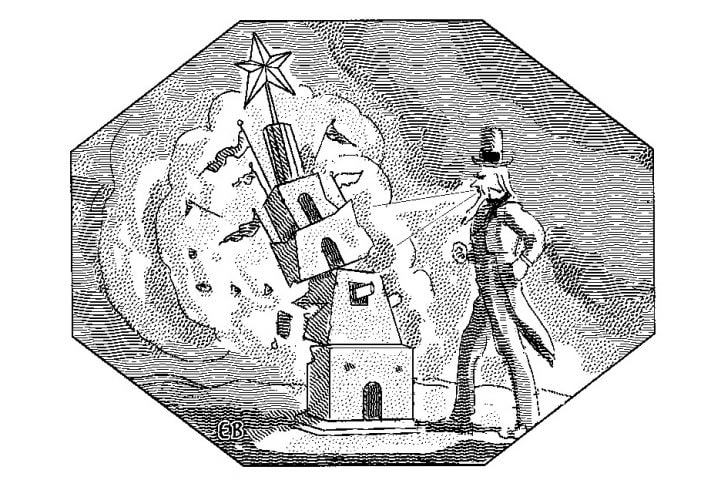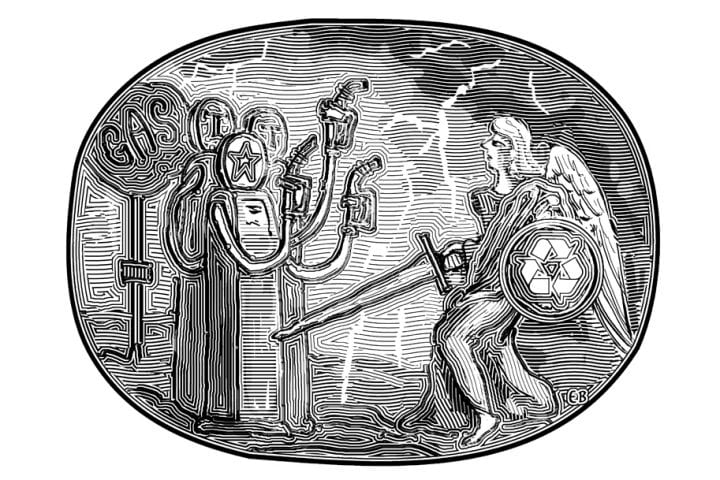Books Reviewed
Back in 1969, the Mexican novelist Carlos Fuentes suggested that much of the history of Latin America—its nervous politics, its fantastical literature, its baroque culture—could be derived from the fact that the conquistadors arrived in the New World with swords at their waists and a trio of 16th-century books in their backpacks: Erasmus’s In Praise of Folly, Thomas More’s Utopia, and Machiavelli’s The Prince. Fuentes was enormously influential, but the claim that Latin America was formed by this curious trio remains more suggestive than rigorous, more true-ish than true.
We have an interestingly similar legend about books in the early moments of the United States, fueled by the academic discipline known as “American Studies” that flourished in the nation’s universities after World War II. Every pioneer home, the American version insists, had two books on its mantelpiece: a King James Bible and William Blackstone’s Commentaries on the Laws of England. Every man his own priest, and every man his own lawyer—it was like the national character in a thumbnail, a thought-provoking synecdoche for the whole of the American experiment, even if the notion was more suggestive than rigorous. True-ish than true.
* * *
If anyone could sort out the actual facts about the literary foundation of American culture, it would be Notre Dame’s Mark Noll—our great historian of Protestant Christianity in the United States and author of more than 20 books, including his widely discussed The Scandal of the Evangelical Mind (1994). His latest work, In the Beginning Was the Word, is a study of the Bible in American public life from 1492 to 1783, the first in a planned multi-volume series that will trace the Bible’s influence up to the present day.
For all that, there’s something a little odd about Noll’s account. Not in the research itself; this is the work of a master scholar, assembling the definitive study after a lifetime of investigation in the field. It’s just that any student of American cultural history would probably assume that this material had already been gathered. How could we require a study of the Bible in American public life, when the Bible so clearly helped define the nation? It’s sobering to realize that we might still need this kind of systematic work—it’s like discovering that our scholars have produced thousands of studies of things floating in air, without ever bothering to mention the air that surrounds them.
At the same time, there’s something revealing—something indicative of the changes in America over the past 50 years—that we should get a book like this now. When the Bible was simply the air we breathed, we hardly needed to mention it—but that air has grown thin. The Mainline Protestant churches no longer set the tone of the nation, and Biblical knowledge is no longer a required part of educated culture. A 1997 Barna survey claimed that 12% of American adults imagine that Joan of Arc was Noah’s wife; Barna’s 2000 follow-up concluded that 75% of Americans believe the Bible teaches that “God helps those who help themselves.” These days, in a way that we never needed before, we must force ourselves to remember the role of the Bible in American public life, if we have any hope of making the past intelligible.
* * *
In the Beginning Was the Word opens with an observation that it was not Protestants, with their post-Martin Luther cult of Bible reading, but Christopher Columbus who first brought the Bible to the New World. The Catholic explorer’s haunted, almost feverish journals are filled with Scripture-tinged descriptions of what he felt he was accomplishing.
In this, Noll indulges a little too irenic an ecumenism, I think. Columbus was far more Marian, far more apocalyptic, and far more invested in what Protestants would denounce as an un-Biblical works-righteousness than Noll allows. One gets the sense, from those journals, that Columbus thought he was personally bringing about the Second Coming by introducing the gospel to one of the last populations of the world that had not yet had the chance to accept or reject Christianity.
Once Noll’s account moves to North America, however, we begin to see the way Protestant Bibles spread concurrently with the establishment of Protestant polities. A turning point in all this is the enthronement of William and Mary in 1689—for it’s after the Glorious Revolution that the Puritans began to think of themselves as generally part of the worldwide movement of Protestantism, rather than as a pilgrim people set entirely apart from all other believers. From there, it was only a short step to the kind of Biblical proof-texting of public events that Noll catalogues. He looks, for example, to the minister Elisha Williams’s 1744 pamphlet, The Essential Rights and Liberties of Protestants, which gathered texts from the Bible to help establish the “Whig-biblical confluence” that, Noll shows, blended the Biblicism of Protestant sermonizing with the political justification of revolution against the British king.
By the 19th century, English-language knowledge of the Bible would be dominated by the 1611 King James Version—the translation that, in America, would most lend phrases to our daily speech, images to our literature, and the generally falling metrical patterns that characterized public rhetoric. Noll notes, however, that in the earlier days of American colonization there were helpers for that role, especially the 1560 Geneva Bible and the 1646 Reformed account of Christian faith known as the Westminster Confession. The Geneva Bible was the first translation to add verse numbering, which, Noll points out, “tilted instincts about Scripture away from the human and toward the divine,” for “it made it much easier to assemble proof-texts from throughout the sacred volume.” Meanwhile, the Westminster Confession became the model for all subsequent writing that referenced Biblical passages as proof-texts: each claim in a document followed by reference to chapter and verse of the Biblical passages that support it.
* * *
Even while he relates this history, Noll records his uneasiness. Catholic scholars these days tend to use as a term of denunciation the word “Constantinianism”—named for the 4th-century emperor who sought to reconcile the Church with the Roman Empire, and meaning, generally, the mutual support and consequent entanglement of Church and State. In much the same way, Noll calls his work a “cautionary tale,” for he shares the modern discomfort with anything suggesting that the Bible trumpets national faith or allows us to identify a special providence in the role of the United States, above or apart from the general providence belonging to other nations. The strong influence of the Bible in American public life had the unintended and ironic effect, he suggests, of weakening—“thinning,” Noll calls it—the Bible’s power to transform individual souls. The wholesale absorption of the Bible “short-circuited the capacity for self-criticism that Scripture everywhere demands of God’s elect people.”
He’s thinking of writers who, for example, used stray Biblical citations to justify slavery. Their abolitionist opponents, however, were hardly less forward in proof-texting their opposition to slavery. It was, Noll observes, the American way: stray Biblical passages, isolated from their context, were routinely deployed to provide tropes and metaphors, justifications and validations, for just about every topic that came up in public life. And the author is disturbed whenever he sees the Bible being used for these public purposes. It’s the shudder of the Christian believer (which Noll very much is) as he watches the Bible wrenched away from its private and ecclesial uses.
As I noted, something significant about our recent history is revealed by the very existence of In the Beginning Was the Word. Something important about our current cultural situation is exposed by our need for a book this good in order to understand how Americans before us spoke and thought. At the same time, there’s something that feels dated about Noll’s suspicions of the Bible’s political use.
In one sense, he’s fighting a battle won long ago, like a general refusing to take victory for an answer. Where in mainstream public life might one go today to hear Biblical proof-texting of “sanctioned murderous assaults on the sort of marginal people for which Scripture requires special consideration”? Who now carries Constantine’s banner in America and praises public religion above private reformation of the heart? Noll was kinder to public Biblicism when discussing Abraham Lincoln’s rhetoric in America’s God (2002).
* * *
Perhaps more to the point, we make a mistake when we see the history of America’s Bible-reading Protestant culture as a struggle between public and private religion—as though the fights of the 1970s were the model for all theological and ecclesial battles the nation has ever fought. Mark Noll is too sophisticated and complete a scholar to make this mistake, but he has a slight tendency toward it. And we need, I think, a stronger stomach for the existence of real tension through the long history of the nation. “Biblical America” is the oxymoron that defined us, the contradiction that maintained us. American exceptionalism was not born from a lifeboat theology of small, isolated communities of the saved, nor from Biblical justifications of grand national purpose, but from the enduring tension between the two—a tension that is, I think, very Biblical.
Still, In the Beginning Was the Word simply defines its field for everyone who comes after. Mark Noll uncovers a stunning number of illustrative examples of Biblical uses in public life, which bring the past alive for the reader. Throughout the book, we are drawn into a world so thick with Biblical reference that its thesis is absorbed through our skin: the Bible as the defining text of American culture.
In claiming Erasmus, Thomas More, and Machiavelli as the foundation of Latin American culture, Carlos Fuentes was indulging suggestiveness above precision. In claiming the Bible as the foundation of the United States, Noll indulges nothing beyond what he can demonstrate. This may be the most suggestive book about the history of the American experiment published in the last decade, but its suggestiveness rests on the ground of its precise scholarship.




